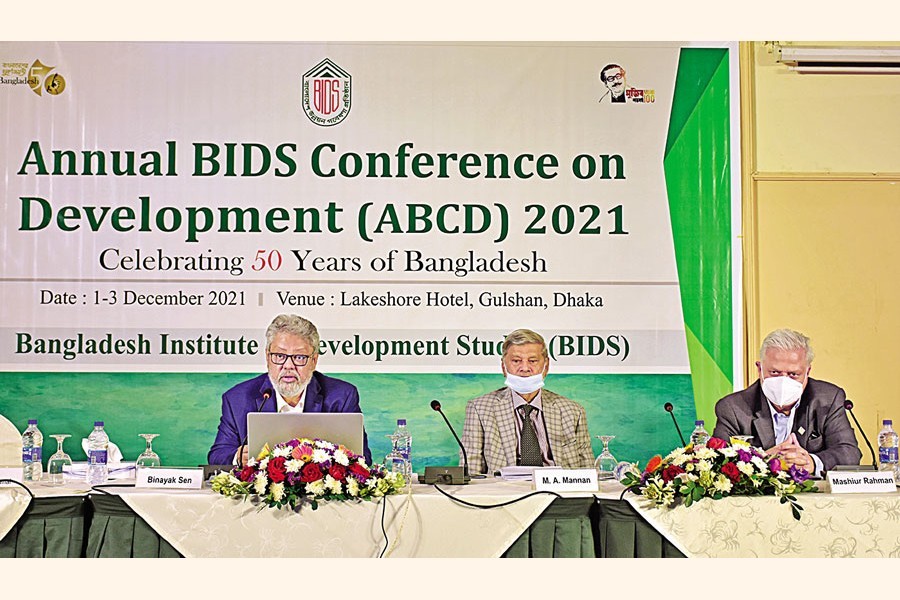Economists and policy experts Wednesday appreciated Bangladesh's advances but spotlighted lapses like factious politics, lack of governance, corruption, inequality and high tax incidence that taint business climate and affect investment.
Those factors are prompting money laundering out of the country rather than investing inside the country, they said at a Bangladesh Institute of Development Studies (BIDS) meet.
The speakers were also critical about some unproductive public-fund expenditures without quality development and on the slow progress of the projects.
Local and foreign economists, researchers, development analysts, and policymakers were speaking on the first day of the three-day 'Annual BIDS Conference on Development 2021'.
Planning Minister MA Mannan attended its inaugural session as the chief guest while economic adviser to the Prime Minister Dr Masiur Rahman was the special guest. BIDS Director-General Dr Binayek Sen was in the chair.
Finance Minister AHM Mustafa Kamal, who was also to join the programme as a special guest, didn't turn up.
Economist and former Deputy Chairman of the Planning Commission (PC) Dr Nurul Islam, economist Dr Rehman Sobhan, former World Bank Lead Economist Dr Zahid Hussain, US economist Dr Calla Weimar and BIDS Research Director Monzur Hossain also spoke, among others.
Dr Nurul Islam said: "Politics is the main reason behind the rising income inequality in the country. When a country has lack of political stability, investment there will be a far cry. And the money will be siphoned off the country."
Besides, the higher-tax regime is impeding foreign direct investment in Bangladesh, he added.
When the money is being laundered out of the country, nobody is questioning that, said Dr Islam, who was the first Deputy Chairman of the PC.
Hailing Bangladesh's achievement in poverty reduction, Dr Islam said quality and accurate data from neutral sources are imperative at this moment for taking best policies for the development of the country by 2041.
Dr Rehman Sobhan in his speech said there had been significant development especially in the rural areas in Bangladesh over the years as the non-governmental organizations had also worked with the government.
"The NGOs have played vital role in social enterprise development, education and health improvement, especially for the deprived women. For this reason, there are some social transformations along with their economic condition," he added.
Although the country is going forward with its poverty reduction and economic development, but there are still corruption and lack of governance, resulting in a vulnerable growth, Dr Sobhan told the cutting-edge meet on economy and development.
Former World Bank Lead Economist in Dhaka Dr Zahid Hussain said although public investment is growing, year on year, but expected level of quality development is still far behind the potential due to those leakages.
Over the last two years, the country's debt-GDP (gross domestic product) ratio had been enhanced by around 4.0 percentage points to 40.75 per cent.
"But the public funds are not being utilized properly, which is eroding the potential development ambition of the country. There's huge lack of quality sectoral expenditures here."
"Corruption, limited political energy, substantial procedural blockages are compromising the good intention and initiatives of the government," Dr Hussain told his audience.
Dr Binayek Sen, hailing Bangladesh's development over the last two and a half decades, said the country has outperformed Pakistan and even India in many indicators.
He said: "Bangladesh's per-capita GNI was 55 per cent of Pakistan in the 1990s. But in 2010s, Bangladesh's per-capital GNI is 10 per cent higher than Pakistan's."
In terms of growth rate, Bangladesh has consistently been outperforming India and Pakistan since early 2010s, the DG of the autonomous body on development studies told the meet.
In his inaugural speech, Planning Minister MA Mannan said Bangladesh is now a development model in the global arena.
"This development history of Bangladesh has got a new shape from 2010s when the Sheikh Hasina government took over," he added.
Replying the critical views on development expenditure, Mr Mannan said although there are some political influences in selecting the development projects but the PC always gives the priority-one of the country. His ministry is working independently on this issue as the PM helps a lot.
Urging the BIDS in presenting the country's economy properly, the planning minister assured that the Institute would work independently till his ministerial job.
The conference ends Friday.


